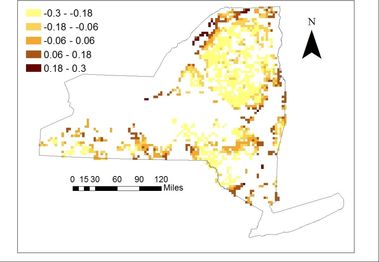 Example of the estimated change in the occupancy probability of an avian species over time in New York
Example of the estimated change in the occupancy probability of an avian species over time in New York
 Example of the estimated change in the occupancy probability of an avian species over time in New York Example of the estimated change in the occupancy probability of an avian species over time in New York Breeding bird atlases are unique datasets that rely on volunteers to collect information about where birds are found across entire states at a very fine scale. New York, for example, contains over 5,000 individual atlas blocks with a record of every species that was observed there in the early 1980s and again in the early 2000s. As a result, Atlas data can offer powerful insights into the factors that shape species distributions over time. One problem with Atlas data, however, is that they haven’t been collected in a way that makes it easy to account for imperfect detection. When a volunteer is out in the field looking for birds, inevitably a few species will be missed due to secretive behavior, misidentification, or even poor weather conditions. Failure to account for imperfect detection of birds that are actually present means we will underestimate how widespread those species are and potentially draw inaccurate conclusions about the factors that influence their distributions. Typically, researchers estimate detection probability by visiting the same site multiple times and recording how often each species is observed. Atlas data does not include information about how often a species was detected in each block. It does, however, include an estimate of effort, or the amount of time spent surveying. Ph.D. student Michelle Peach and coauthors have published a method in Journal of Applied Ecology to account for imperfect detection with Atlas data using effort as a surrogate for repeated surveys and covariates, such as habitat availability, to estimate whether a block was truly occupied or not. The approach was applied to model Canada warbler distributions in New York over a 20 year period and demonstrated a potential decline that wasn’t seen using other methods. It was also found that declines were particularly high in areas where Canada warblers were initially more likely to be found. This approach thus makes it possible to both identify declining species and more effectively target conservation efforts.
Comments are closed.
|
Categories
All
Archives
July 2019
|
 RSS Feed
RSS Feed
